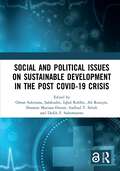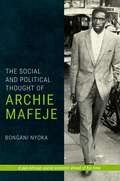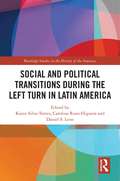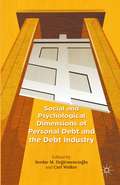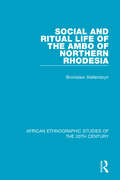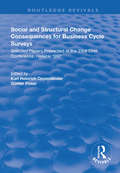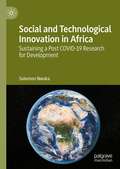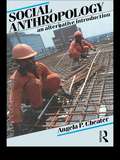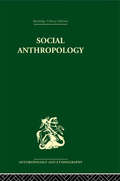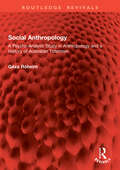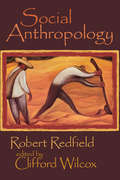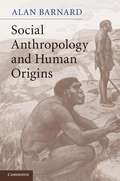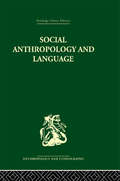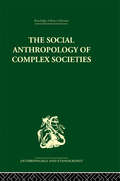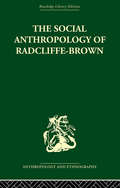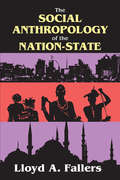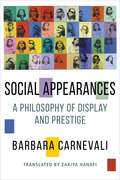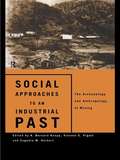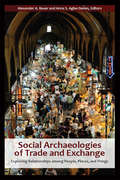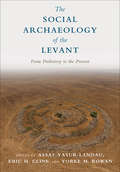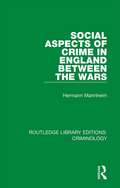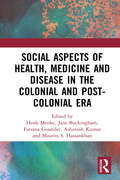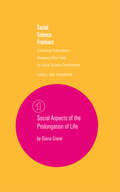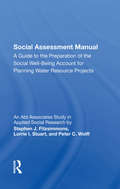- Table View
- List View
Social and Political Issues on Sustainable Development in the Post Covid-19 Crisis: Proceedings of the International Conference on Social and Political Issues on Sustainable Development in the Post Covid-19 Crisis (ICHSOS 2021), Malang, Indonesia, 18-19 June 2021
by Oman SukmanaAs a threat, a pandemic has indirect implications for social, economic and political conditions both at domestic and international levels. Thus, collective and comprehensive efforts are needed in responding to and preventing the expansion of infections caused by the virus, including Covid-19. This international conference provides the discourse on social, economic as well as political issues regarding the condition after the pandemic. Social issues are studied through social welfare, sociology, governance, communication and international relations approaches. Meanwhile, economic problems are discussed through business, economic development and economic management approaches. Under the First International Conference on Humanities and Social Sciences (ICHSOS) 2021, speakers from several countries provided solutions and alternative perspectives in preventing and dealing with problems after the Covid-19 pandemic. This book contains 42 papers presented at the conference.
The Social and Political Thought of Archie Mafeje
by Dr. Bongani NyokaThis comprehensive treatment of Archie Mafeje as a thinker and researcher analyses his overall scholarship and his role as a theoretician of liberation and revolutionary theorySocial scientist Archie Mafeje, who was born in the Eastern Cape but lived most of his scholarly life in exile, was one of Africa's most prominent intellectuals. This ground-breaking work is the first of its kind to consider the entire body of Mafeje’s oeuvre and offers a much-needed engagement with his ideas. The most inclusive and critical treatment to date of Mafeje as a thinker and researcher, the book analyses his overall scholarship and his role as a theoretician of liberation and revolution. Author Bongani Nyoka's main argument is that Mafeje’s superb scholarship developed out of his experience as an oppressed black person and his early political education, which merged with his university training to turn him into a formidable cutting-edge intellectual force. There are three main parts to the book. Part I evaluates Mafeje's critique of the social sciences, part II focuses on his work on land and agrarian issues in sub-Saharan Africa and part III deals with his work on revolutionary theory and politics. The book engages in the act of knowledge decolonisation, making a unique contribution to South Africa’s sociological, historical and political studies.
Social and Political Transitions During the Left Turn in Latin America
by Daniel S. Leon Karen Silva-Torres Carolina Rozo-HigueraSocial and Political Transitions During the Left Turn in Latin America provides fourteen contributions to understand, from a multidisciplinary perspective, processes of socio-political reconfigurations in the region from the early 2000s to the mid-2010s. The Left Turn was the regional shift to left-of-center governments and social movements that sought to replace the neoliberal policies of the 1990s. This volume aims to answer the overarching research question: how do state and societal (national and transnational) actors trigger and shape processes of political and socio-economic transitions in Latin America from the rise to the decline of the Left Turn. The book presents case studies in which transitions are moments of change and uncertainty, which one cannot predict their definitive outcomes. The various case studies presented in the book place actors and processes in specific historical and socio-political contexts, which are influenced directly or indirectly by the historical trajectory of Latin America’s Left Turn. This book is essential reading for students and scholars of Social and Political History, Latin American History, and those interested in the social and political developments in Latin America more broadly.
Social and Psychological Dimensions of Personal Debt and the Debt Industry
by Serdar M. Degirmencioglu Carl WalkerAn understanding of personal debt requires an understanding of the complex social systems that produce poverty. By drawing upon international perspectives, this book investigates why more and more people are in debt, why it is causing so much mental distress and exactly who is benefiting from what has become the world's number one growth industry.
Social and Ritual Life of the Ambo of Northern Rhodesia: Studies Presented And Discussed At The Tenth International African Seminar At Fourah Bay College, Freetown, December 1969
by Bronislaw StefaniszynOriginally published in 1964, this is a detailed ethnographic record and sympathetic study of Ambo beliefs and activities. The significance of the clan and the matrilineage are discussed and the organization of the village and chiefdom analysed. Childhood and puberty, marriage, death, succession and inheritance are covered, along with religious concpets and divination, with its stress on the importance of the high god.
Social and Structural Change: Consequences for Business Cycle Surveys - Selected Papers Presented at the 23rd Ciret Conference, Helsinki (Routledge Revivals)
by Karl Heinrich Oppenländer Günter PoserFirst published in 1998, this wide-ranging and in-depth volume from specialists in economics and statistics examines leading indicators, the timing of cyclical turning points, firm behaviour, financial indicators, economic policy recommendations, transition economies and the service sector in relation to Finland’s bid for European Monetary Union membership.
Social and Technological Innovation in Africa: Sustaining a Post COVID-19 Research for Development
by Solomon NwakaThis book examines the landscape of sustained investment in research and innovation in Africa, which are critical for development. This cutting-edge analysis is based on empirical evidence and the author’s experience in managing health and related innovations on the continent and globally. It concludes, for the first time, that African innovation is largely driven by the principles of Social, rather than Technological innovation. The significance of this finding and the need to optimize, scale and sustain this dominant innovation is addressed in various chapters that analyze the status, challenges and opportunities. Particularly, the financing, collaboration and coordination patterns for these activities on the continent show a fragmented ecosystem that is largely dependent on external donors and aid. The importance of supportive policies, leadership and venture mechanisms that incentivizes public and private entities to innovate is further exemplified by the lessons of the COVID-19 pandemic. The book proposes mechanism to address identified challenges.
Social Anthropology: An Alternative Introduction
by Angela P. CheaterAn introduction to the central concerns of social anthropology, presenting an alternative to standard texts. More concerned with the life-worlds of underdevelopment than the primitive or the exotic, it draws on material which evokes current problems of policy and administration in the Third World. The author raises questions of vital importance to contemporary investigation and analysis, and pointers to the future for anthropology.
Social Anthropology
by E.E. Evans-PritchardSocial Anthropology explains and illustrates the methods of modern anthropology, tracing its development from pre-nineteenth-century philosophical speculations and the empirical work of explorers, missionaries and colonial servants, up to the second half of the twentieth century. First published in 1951.
Social Anthropology: A Psycho-Analytic Study in Anthropology and a History of Australian Totemism (Routledge Revivals)
by Géza RóheimNumerous have been the attempts to unveil what Andrew Lang called the Secret of the Totem, a question upon which Sir J. G. Frazer once said he had changed his views repeatedly and was prepared to change them with every new piece of evidence.Dr Róheim, a young Hungarian anthropologist, whose work had already attracted the attention of English authorities, surveys totemism in the light of psychoanalytic knowledge in his book Social Anthropology originally published in 1925. Freud and Rivers are pioneers in this field but Róheim’s work is the first attempt to submit a specific anthropological question to detailed psychoanalytical investigation. In result, it will be seen that the application of the investigations of unconscious mental processes in the individual to a study of the Australian native give a profound meaning and universal psychologic significance to customs whose understanding has hitherto baffled scholarship. The book is not a translation; it was written by Dr Róheim in English. Due to modern production methods, it has not been possible to include some fold-out maps within the book. Any purchasers of the book will be able to receive a free pdf of the relevant pages by contacting Routledge Customer Services. https://www.routledge.com/contacts/customer-service
Social Anthropology: Robert Redfield (University Of Chicago Publications In Anthropology. Social Anthropology)
by Clifford WilcoxRobert Redfield is remembered today primarily as an anthropologist, but during his lifetime Redfield's cross-disciplinary activity reflected a strong interest in infusing anthropological practice with sociological theory. Like a handful of other anthropologists, including A.R. Radcliffe-Brown and Bronislaw Malinowski, who shared his interests during the 1920s through 1930s, his works came to define a new subfield known as social anthropology.Redfield was distinct in being one of the first Americans to devote himself seriously to social anthropology, a field dominated initially by British scholars. He spent his career at the University of Chicago, and his anthropology bore the distinct mark of sociology as developed and practiced at that institution. Indeed, Redfield played a major role in defining what has been called the second Chicago school of sociology. This volume brings together Redfield's most important contributions to social anthropology.During the 1920s, sociology and anthropology constituted a single department at the University of Chicago. Although most students concentrated on sociology or anthropology, Redfield chose to pursue both fields with equal intensity. He adopted as his central interest the leading problematic of the 1920s: the study of social change. Chicago School sociologists approached social change by examining zones of rapid transition within the city, for example, areas populated by recently-arrived immigrants, with the goal of elucidating general principles or dynamics of social transition.Redfield's work can be seen as falling into three distinct theoretical categories: (1) the study of social change or modernization; (2) peasant studies; and (3), the comparative study of civilizations. Drawing from articles, book excerpts, and unpublished papers and letters, this work presents Redfield's central contributions in each of these areas. Seen as a whole, this volume traces Redfield's seminal contributions to the early development of mo
Social Anthropology and Human Origins
by Alan BarnardThe study of human origins is one of the most fascinating branches of anthropology. Yet it has rarely been considered by social or cultural anthropologists, who represent the largest subfield of the discipline. In this powerful study Alan Barnard aims to bridge this gap. Barnard argues that social anthropological theory has much to contribute to our understanding of human evolution, including changes in technology, subsistence and exchange, family and kinship, as well as to the study of language, art, ritual and belief. This book places social anthropology in the context of a widely-conceived constellation of anthropological sciences. It incorporates recent findings in many fields, including primate studies, archaeology, linguistics and human genetics. In clear, accessible style Barnard addresses the fundamental questions surrounding the evolution of human society and the prehistory of culture, suggesting a new direction for social anthropology that will open up debate across the discipline as a whole.
Social Anthropology and Language
by Edwin ArdenerProviding a critical framework for the consideration of the relationship between modern social anthropology and linguistics, this volume covers topics such as classification, symbolism, and structuralism. The relevance of the works of Saussure, Lévi-Strauss and Chomsky is considered. There are two case-studies: the first outlines a 'social history' of the succession of pidgins that are documented on the West African coast, ending with Pidgin English. The second analyzes the status of three language varieties used in a 'trilingual' community in the Carnian Alps.Originally published in 1971.
Social Anthropology of Complex Societies
by Michael BantonThis volume illustrates how much the study of social anthropologists has encompassed other, non-primitive societies: rural Italy, urban Africa, village politics in India and the smaller ex-colonial territories of Fiji and Mauritius are just some of the areas covered by the book. The position and contribution of British community studies is also examined, illustrating how micro-sociology can be made relevant to macro-sociology. Originally published 1966.
The Social Anthropology of Radcliffe-Brown
by Adam KuperThis is the first collection of Radcliffe-Brown's work chosen to represent his books as well as his essays. It includes some classic pieces, and also one or two lesser-known items. Radcliffe-Brown was a pioneer who established structural, sociological anthropology, in the face of the entrenched traditions of ethnology and social evolutionism. First published in 1977.
The Social Anthropology of the Nation-State
by Lloyd FallersThe contemporary nation-state is popular in that it rests upon mutual identification between rulers and ruled. Such identification is based upon common primordial qualities that are felt to be ancient, inherent, given, however new they may in fact be: language, territory, culture, race. But the nation-state has also produced far more rigorous authoritarianisms and frequently less tolerance than old empires. Anthropology, the -study of man, - for all the immodesty of its name, has concerned itself almost exclusively with people in small groups: bands, tribal segments, village communities, and, recently, urban neighborhoods, schools, and work places. Social anthropology has been the science of the socio-cultural microcosm and has developed a method and style of inquiry appropriate to this task. This volume uniquely applies the techniques of social anthropology to the study of the nation-state. This discussion of states and their microcosms does not simply celebrate social anthropological research and the understanding it yields, but also illustrates its contribution, in combination with other modes of investigation, to the understanding of contemporary international issues. In particular, Fallers says it is necessary to place the microcosms historically, for those who inhabit them act within history as experienced, both directly by themselves and, at further remove, by their predecessors and contemporaries. This classic volume offers a different perspective for understanding international issues.
Social Appearances: A Philosophy of Display and Prestige (Columbia Themes in Philosophy, Social Criticism, and the Arts)
by Barbara CarnevaliPhilosophers have long distinguished between appearance and reality, and the opposition between a supposedly deceptive surface and a more profound truth is deeply rooted in Western culture. At a time of obsession with self-representation, when politics is enmeshed with spectacle and social and economic forces are intensely aestheticized, philosophy remains moored in traditional dichotomies: being versus appearing, interiority versus exteriority, authenticity versus alienation. Might there be more to appearance than meets the eye?In this strikingly original book, Barbara Carnevali offers a philosophical examination of the roles that appearances play in social life. While Western metaphysics and morals have predominantly disdained appearances and expelled them from their domain, Carnevali invites us to look at society, ancient to contemporary, as an aesthetic phenomenon. The ways in which we appear in public and the impressions we make in terms of images, sounds, smells, and sensations are discerned by other people’s senses and assessed according to their taste; this helps shape our ways of being and the world around us. Carnevali shows that an understanding of appearances is necessary to grasp the dynamics of interaction, recognition, and power in which we live—and to avoid being dominated by them. Anchored in philosophy and traversing sociology, art history, literature, and popular culture, Social Appearances develops new theoretical and conceptual tools for today’s most urgent critical tasks.
Social Approaches to an Industrial Past: The Archaeology and Anthropology of Mining
by Eugenia W. Herbert A. Bernard Knapp Vincent C. PigottSocial Approaches to an Industrial Past addresses the social issues of mining communities in research spanning a period of 4,500 years. The volume considers themes which are relatively new to archaeology: * the social context of production * gender * power and labour exploitation * imperialism and colonialism * production and technology.
Social Archaeologies of Trade and Exchange: Exploring Relationships among People, Places, and Things
by Alexander A. Bauer Anna S. Agbe-DaviesThis volume focuses on the anthropological concept of trade as a fundamentally social activity concerned not only with the movement of goods, but also on the social context and consequences of that exchange. The distinguished contributors discuss trade on a range of scales—from a solitary confinement cell to trans-oceanic networks—in settings around the world and over the past 3000 years. They address themes such as exchange as a communicative act, the ways in which exchange transforms the relationship between people and things, the significance of agency and power in contexts of trade, and how sites of consumption and discard speak to processes of exchange. The volume merges traditional archaeological concerns about trade and exchange with more contemporary issues of agency, identity and social meaning.
The Social Archaeology of the Levant: From Prehistory to the Present
by Assaf Yasur-Landau Eric H. Cline Yorke RowanThe volume offers a comprehensive introduction to the archaeology of the southern Levant (modern day Israel, Palestine and Jordan) from the Paleolithic period to the Islamic era, presenting the past with chronological changes from hunter-gatherers to empires. Written by an international team of scholars in the fields of archaeology, epigraphy, and bioanthropology, the volume presents central debates around a range of archaeological issues, including gender, ritual, the creation of alphabets and early writing, biblical periods, archaeometallurgy, looting, and maritime trade. Collectively, the essays also engage diverse theoretical approaches to demonstrate the multi-vocal nature of studying the past. Significantly, The Social Archaeology of the Levant updates and contextualizes major shifts in archaeological interpretation.
Social Aspects of Applied Human Genetics (Social Science Frontiers #Vol. 3)
by James R. SorensonThis report explores the complex ethical, political, psychological, and economic questions that arise from developments in medical genetics. It reviews research in applied genetics at the interface of the social and bio-medical fields, including the counseling and study of birth control, as well as the active treatment and selection of individual genetic attributes.
Social Aspects of Crime in England between the Wars (Routledge Library Editions: Criminology)
by Hermann MannheimOriginally published in 1940. This ground-breaking work formed the foundation for modern criminology becoming an academic discipline within UK sociological studies. It concerns the history of crime, its causes and treatment in England during the preceding twenty-five years or so. Mannheim, through this and later studies, went on to found the criminology department at LSE. The book offers an evaluation of the criminological implications of the War and early post-War period as well as an examination of the practical working of the new penal machinery built up by the Reform Acts passed just prior to the War. The author produced a scientific account of the post-War state of crime, beginning with a critical examination of the structure and interpretation of English Criminal Statistics followed by a survey of the principal criminological features of the period between the two Wars. Significant aspects are dealt with in a separate chapters - four devoted to problems of work and leisure (Unemployment and Strikes, Business Administration, Alcoholism, and Gambling), four others to those of certain specific sections of the population (Juvenile Delinquency, Female Delinquency and Prostitution, Recidivism). This is a fascinating read for both the historian and the criminologist.
Social Aspects of Health, Medicine and Disease in the Colonial and Post-colonial Era
by Henk Menke, Jane Buckingham, Farzana Gounder, Ashutosh Kumar and Maurits S. HassankhanFrom the 1600s, enslaved people, and after abolition of slavery, indentured labourers were transported to work on plantations in distant European colonies. Inhuman conditions and new pathogens often resulted in disease and death. Central to this book is the encounter between introduced and local understanding of disease and the therapeutic responses in the Caribbean, Indian and Pacific contexts. European response to diseases, focussed on protecting the white minority. Enslaved labourers from Africa and indentured labourers from India, China and Java provided interpretations and answers to health challenges based on their own cultures and medicinal understanding of the plants they had brought with them or which they found in the natural habitat of their new homes. Colonizers, enslaved and indentured labourers learned from each other and from the indigenous peoples who were marginalized by the expansion of plantations. This volume explores the medical, cultural and personal implications of these encounters, with the broad concept of medical pluralism linking the diversity of regional and cultural focus offered in each chapter. Please note: Taylor & Francis does not sell or distribute the Hardback in India, Pakistan, Nepal, Bhutan, Bangladesh and Sri Lanka.
Social Aspects of the Prolongation of Life (Social Science Frontiers)
by Diana CraneA volume of the Russell Sage Foundation's Social Science Frontiers, occasional publications reviewing new fields for social science development. This paper explores the links between the social and biomedical sciences concerning the prolongation and termination of life, with the aim to stimulate scholars, foundations, and government agencies to further study death and dying in American society. DIANA CRANE is associate professor of sociology at the University of Pennsylvania.
Social Assessment Manual
by Judith Fitzsimmons Edward SampsonA Social Well-Being Account is the product of an assessment of the comparative beneficial and adverse social effects likely to occur as a result of implementing—or not implementing—a particular development plan. This volume establishes procedures for conducting research and analyzing data in order to make this assessment for water development plans
